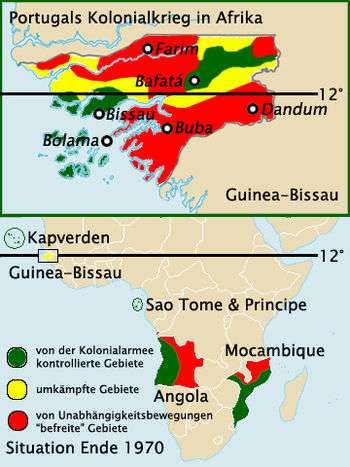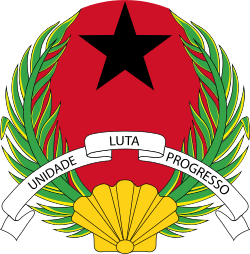History of Guinea-Bissau
Guinea-Bissau was dominated by Portugal from the 1450s to the 1970s; since independence, the country has been primarily controlled by a single-party system.
Portuguese Rule
The rivers of Guinea and the islands of Cape Verde (Cabo Verde) were among the first areas in Africa explored by the Portuguese. Portugal claimed Portuguese Guinea in 1446, but few trading posts were established before 1600. With the cooperation of some local tribes, the Portuguese entered the slave trade and exported large numbers of Africans to the Western Hemisphere via the Cape Verde. The local African rulers in Guinea, who prospered greatly from the African slave trade, had no interest in allowing the Europeans any further inland than the fortified coastal settlements where the trading takes place.
Struggle for independence

_1978%2C_MiNr_2293.jpg)
Amílcar Cabral was assassinated in Conakry in 1973, and party leadership fell to Aristides Pereira, who later became the first president of the Republic of Cape Verde. The PAIGC National Assembly met at Boe in the southeastern region and declared the independence of Guinea-Bissau on 24 September 1973 and was recognized by a 93-7 UN General Assembly vote in November.[1]
Independence from Portugal
Following Portugal's April 1974 Carnation Revolution, it granted independence to Guinea-Bissau on 10 September 1974. Luís Cabral, Amílcar Cabral's half-brother, became President of Guinea-Bissau. Following independence local soldiers that fought along with the Portuguese Army against the PAIGC guerrillas were slaughtered by the thousands. A small number escaped to Portugal or to other African nations. The most famous massacre occurred in Bissorã. In 1980 PAIGC admitted in its newspaper "Nó Pintcha" (dated 29 November 1980) that many were executed and buried in unmarked collective graves in the woods of Cumerá, Portogole and Mansabá. In late 1980, the government was overthrown in a relatively bloodless coup led by Prime Minister and former armed forces commander João Bernardo Vieira.
The United States recognised Guinea Bissau's independence on 10 September 1974.[2]
Vieira's presidency
From November 1980 to May 1984, power was held by a provisional government responsible to a Revolutionary Council headed by President João Bernardo Vieira. In 1984, the council was dissolved, and the National Popular Assembly (ANP) was reconstituted. The single-party assembly approved a new constitution, elected President Vieira to a new 5-year term, and elected a Council of State, which was the executive agent of the ANP. Under this system, the president presides over the Council of State and serves as head of state and government. The president also was head of the PAIGC and commander in chief of the armed forces.
Democracy
In 1994, 20 years after independence from Portugal, the country's first multiparty legislative and presidential elections were held. An army uprising that triggered the Guinea-Bissau Civil War in 1998, created hundreds of thousands of displaced persons. The president was ousted by a military junta on 7 May 1999. An interim government turned over power in February 2000 when opposition leader Kumba Ialá took office following two rounds of transparent presidential elections. Guinea-Bissau's transition back to democracy has been complicated by a crippled economy devastated by civil war and the military's predilection for governmental meddling.
Despite reports that there had been an influx of arms in the weeks leading up to the election and reports of some 'disturbances during campaigning' - including attacks on the presidential palace and the Interior Ministry by as-yet-unidentified gunmen - European monitors labelled the election as "calm and organized".[3]
See also
References
- ↑ United Nations General Assembly Session -1 Resolution 3061. Illegal occupation by Portuguese military forces of certain sectors of the Republic of Guinea-Bissau and acts of aggression committed by them against the people of the Republic A/RES/3061(XXVIII) 2 November 1973. Retrieved 2008-07-01.
- ↑ "A GUIDE TO THE UNITED STATES' HISTORY OF RECOGNITION, DIPLOMATIC, AND CONSULAR RELATIONS, BY COUNTRY, SINCE 1776: GUINEA-BISSAU". Office of the Historian. United States Department of State. Retrieved 14 February 2016.
- ↑ BBC News
